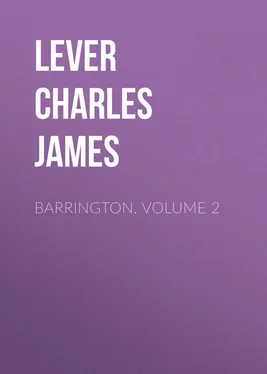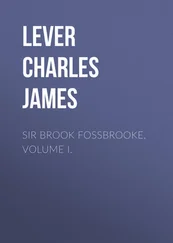“Just so,” broke in Withering; “and I know, for my own part, I have never been able to shake off the flattery of being chosen by the most nefarious rascal to defend him on his trial. Every man is a great creature in his own eyes.”
“Well, sir, be proud of your client,” said she, trembling with anger.
“No, no, – he ‘s no client of mine, nor is this a case I would plead for him. I read you Kinshela’s note because I thought you were building too confidently on M’Cormick’s readiness to advance this money.”
“I understood what that readiness meant, though my brother did not. M’Cormick looked forward to the day – and not a very distant day did he deem it – when he should step into possession of this place, and settle down here as its owner.”
Barrington’s face grew pale, and a glassy film spread over his eyes, as his sister’s words sunk into his heart. “I declare, Dinah,” said he, falteringly, “that never did strike me before.”
“‘It never rains but it pours,’ says the Irish adage,” resumed she. “My brother and I were just discussing another proposal of the same kind when you knocked. Read that letter. It is from a more adroit courtier than the other, and, at least, he does n’t preface his intentions with a bargain.” And she handed Stapylton’s letter to Withering.
“Ah!” said the lawyer, “this is another guess sort of man, and a very different sort of proposal.”
“I suspected that he was a favorite of yours,” said Miss Dinah, significantly.
“Well, I own to it. He is one of those men who have a great attraction for me, – men who come out of the conflict of life and its interests without any exaggerated notions of human perfectibility or the opposite, who recognize plenty of good and no small share of bad in the world, but, on the whole, are satisfied that, saving ill health, very few of our calamities are not of our own providing.”
“All of which is perfectly compatible with an odious egotism, sir,” said she, warmly; “but I feel proud to say such characters find few admirers amongst women.”
“From which I opine that he is not fortunate enough to number Miss Dinah Barrington amongst his supporters?”
“You are right there, sir. The prejudice I had against him before we met has been strengthened since I have seen him.”
“It is candid of you, however, to call it a prejudice,” said he, with a smile.
“Be it so, Mr. Withering; but prejudice is only another word for an instinct.”
“I ‘m afraid if we get into ethics we ‘ll forget all about the proposal,” said Barrington.
“What a sarcasm!” cried Withering, “that if we talk of morals we shall ignore matrimony.”
“I like the man, and I like his letter,” said Barrington.
“I distrust both one and the other,” said Miss Dinah.
“I almost fancy I could hold a brief on either side,” interposed Withering.
“Of course you could, sir; and if the choice were open to you, it would be the defence of the guilty.”
“My dear Miss Barrington,” said Withering, calmly, “when a great legal authority once said that he only needed three lines of any man’s writing ‘to hang him,’ it ought to make us very lenient in our construction of a letter. Now, so far as I can see in this one before us, he neither asks nor protests too much. He begs simply for time, he entreats leave to draw a bill on your affections, and he promises to meet it.”
Конец ознакомительного фрагмента.
Текст предоставлен ООО «ЛитРес».
Прочитайте эту книгу целиком, купив полную легальную версию на ЛитРес.
Безопасно оплатить книгу можно банковской картой Visa, MasterCard, Maestro, со счета мобильного телефона, с платежного терминала, в салоне МТС или Связной, через PayPal, WebMoney, Яндекс.Деньги, QIWI Кошелек, бонусными картами или другим удобным Вам способом.












